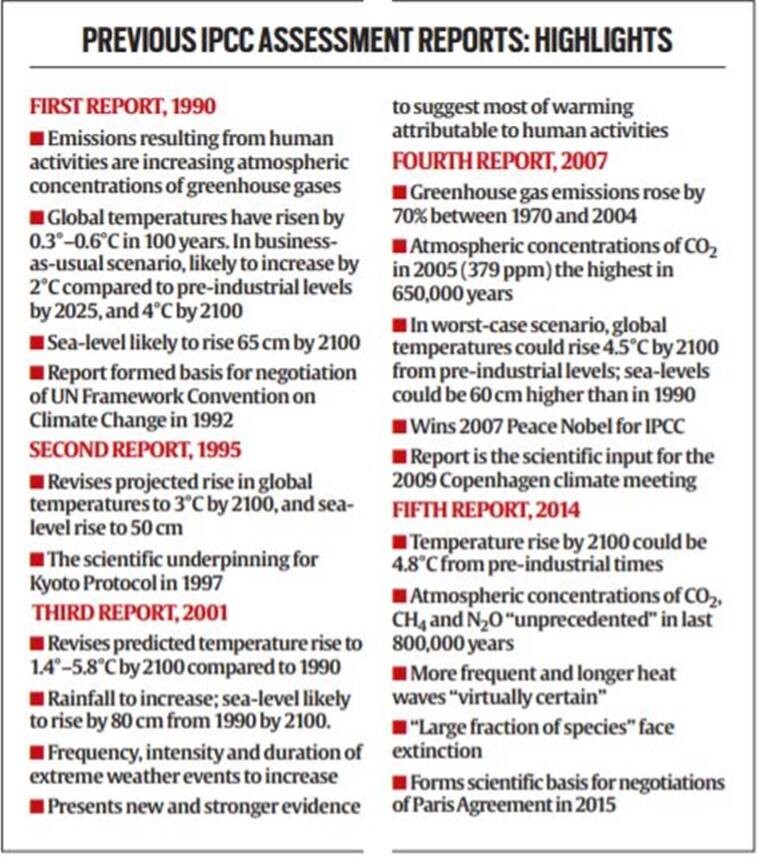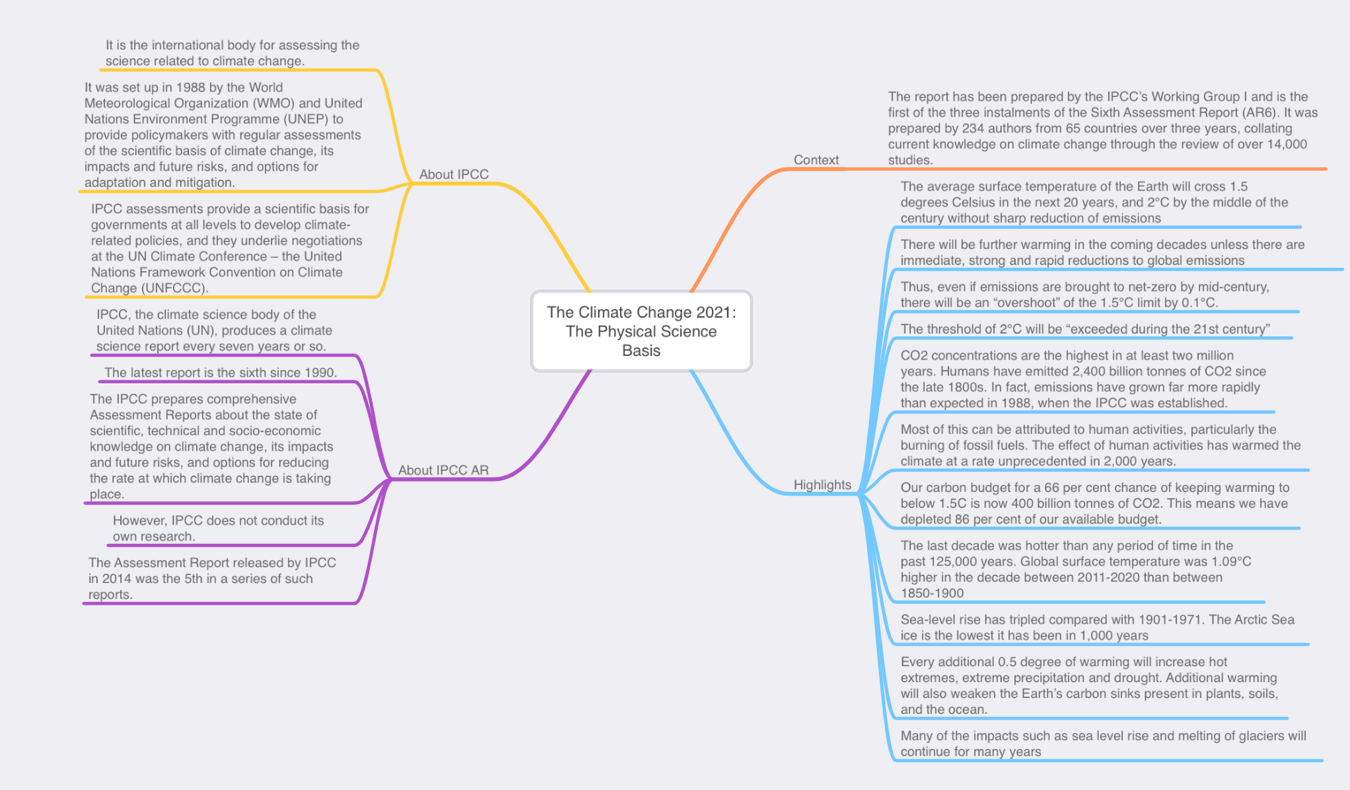CONTEXT: Recently, the Intergovernmental Panel on Climate Change (IPCC) released the first part of its Sixth Assessment Report (AR6) titled Climate Change 2021: The Physical Science Basis.
ABOUT:
- The Climate Change 2021: The Physical Science Basis report has been prepared by the IPCC’s Working Group I and is the first of the three instalments of the Sixth Assessment Report (AR6).
- It was prepared by 234 authors from 65 countries over three years, collating current knowledge on climate change through the review of over 14,000 studies.
- It provides clarity on the future of the planet as concentrations of greenhouse gas (GHG) emissions continue to accumulate unabated in the atmosphere.
- Scientists are now confident that almost all the observed warming of the planet since the late-1800s is human-caused.
- The two remaining parts would be released in 2022.
- It sets the stage for the Conference of Parties (CoP) 26 conference in November 2021.
KEY TAKEAWAYS:
Average Surface Temperature:
- The average surface temperature of the Earth will cross 1.5 degrees Celsius in the next 20 years, and 2°C by the middle of the century without sharp reduction of emissions.
- There will be further warming in the coming decades unless there are immediate, strong and rapid reductions to global emissions.
- Thus, even if emissions are brought to net-zero by mid-century, there will be an “overshoot” of the 1.5°C limit by 0.1°C.
- The last decade was hotter than any period of time in the past 125,000 years.
- Global surface temperature was 1.09°C higher in the decade between 2011-2020 than between 1850-1900
Carbon dioxide (CO2) Concentrations:
- CO2 concentrations are the highest in at least two million years.
- Humans have emitted 2,400 billion tonnes of CO2 since the late 1800s.
- In fact, emissions have grown far more rapidly than expected in 1988, when the IPCC was established.
- Most of this can be attributed to human activities, particularly the burning of fossil fuels.
- The effect of human activities has warmed the climate at a rate unprecedented in 2,000 years.
- Carbon budget for a 66 per cent chance of keeping warming to below 1.5C is now 400 billion tonnes of CO2. This means world has depleted 86 per cent of available budget.
Sea- Level Rise:
- Sea-level rise has tripled compared with 1901-1971.
- The Arctic Sea ice is the lowest it has been in 1,000 years.
- Many of the impacts such as sea level rise and melting of glaciers will continue for many years
- About 50% of the sea level rise is due to thermal expansion.
Precipitation & Drought:
- Every additional 0.5 °C of warming will increase hot extremes, extreme precipitation and drought.
- Additional warming will also weaken the Earth’s carbon sinks present in plants, soils, and the ocean.
Other effects:
- Heat extremes have increased while cold extremes have decreased, and these trends will continue over the coming decades over Asia.
- The freezing level of mountains are likely to change and snowlines will retreat over the coming decades.
- Retreating snowlines and melting glaciers can cause a change in the water cycle, the precipitation patterns, increased floods as well as an increased scarcity of water in the future.
Effect on Indian Sub-continent:
- Heatwaves and humid heat stress will be more intense and frequent during the 21st century over South Asia.
- Both annual and summer monsoon precipitation projected to increase.
- The sea surface temperature over Indian ocean is likely to increase by 1 to 2 °C when there is 1.5°C to 2°C global warming.
ABOUT INTERGOVERNMENTAL PANEL ON CLIMATE CHANGE:
- It is the international body for assessing the science related to climate change.
- It was set up in 1988 by the World Meteorological Organization (WMO) and United Nations Environment Programme (UNEP) to provide policymakers with regular assessments of the scientific basis of climate change, its impacts and future risks, and options for adaptation and mitigation.
- IPCC assessments provide a scientific basis for governments at all levels to develop climate related policies, and they underlie negotiations at the UN Climate Conference – the United Nations Framework Convention on Climate Change (UNFCCC).
- IPCC does not itself engage in scientific research.
- Instead, it asks scientists from around the world to go through all the relevant scientific literature related to climate change and draw up the logical conclusions.
ABOUT ASSESSMENT REPORTS:
- The assessment reports are the most widely-accepted scientific opinion about climate change.
- They form the basis for government policies to tackle climate change, and also provide the scientific foundation for the international climate change negotiations.
- So far, five assessment reports have been produced, the first one being released in 1990.
- The fifth assessment report had come out in 2014 in the run up to the climate change conference in Paris
- The IPCC reports are created by three working groups of scientists.
- Working Group-I, whose report has been released recently, deals with the scientific basis for climate change.
- Working Group-II looks at the likely impacts, vulnerabilities and adaptation issues
- Working Group-III deals with actions that can be taken to combat climate change.
Summary of previous assessments reports:

WAY FORWARD:
- This report must sound a death knell for coal and fossil fuels, before they destroy the planet. But the report also says that there is still a chance to stop the negative climate trends by mid-century by stopping the use of fossil fuels and stopping deforestation.
- Reduce carbon emission: There is a need for a drastic and immediate cut in carbon emissions, given that the changes to the climate already made are not reversible.
- All nations, especially the G20 and other major emitters, need to join the net-zero emissions coalition and reinforce their commitments.
- There is a need to make vulnerability assessment central to long-term planning for developing adaptation and mitigation strategies.
- Regional-scale climate change risk assessments: Inclusion of detailed, regional-scale climate change risk assessments would help develop region and sector-specific mitigation and adaptation measures to reduce vulnerability to climate change.
- Robust observational networks: Greater emphasis on widening observational networks, sustained monitoring, expanding research on regional changes in climate and their impacts.
- Afforestation efforts: It helps to mitigate climate change through carbon sequestration. It also enhance resilience to flash floods and landslides, improve resilience to droughts, improve resilience of coastal infrastructure and habitation rise, reduce vulnerability to extreme heat, and support native wildlife and biodiversity.
- Equity and social justice for building climate resilience since the most vulnerable people such as the poor, the disabled, outdoor labourers and farmers will bear the brunt of climate change impacts.

https://youtu.be/-DNNBD_nLF0
https://www.downtoearth.org.in/news/climate-change/global-warming-limit-of-1-5-c-may-be-breached-by-2040-says-new-ipcc-report-78355
https://indianexpress.com/article/explained/explained-ipcc-assessment-reports-understanding-climate-change-7445587/
https://www.ipcc.ch/report/sixth-assessment-report-working-group-ii/
https://www.ipcc.ch/about/
https://indianexpress.com/article/india/ipcc-report-himalayas-snow-cover-melting-glaciers-climate-change-7445712/
https://www.hindustantimes.com/india-news/implication-for-india-glacial-retreat-cyclones-and-intense-heat-101628532256325.html





